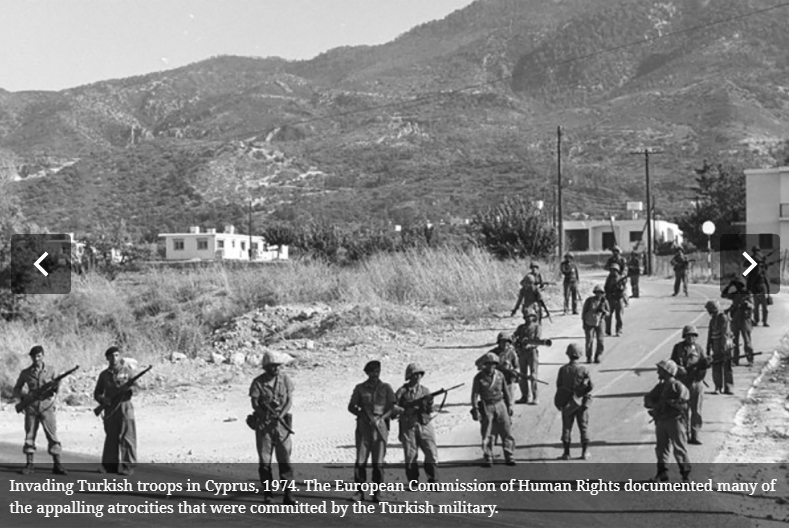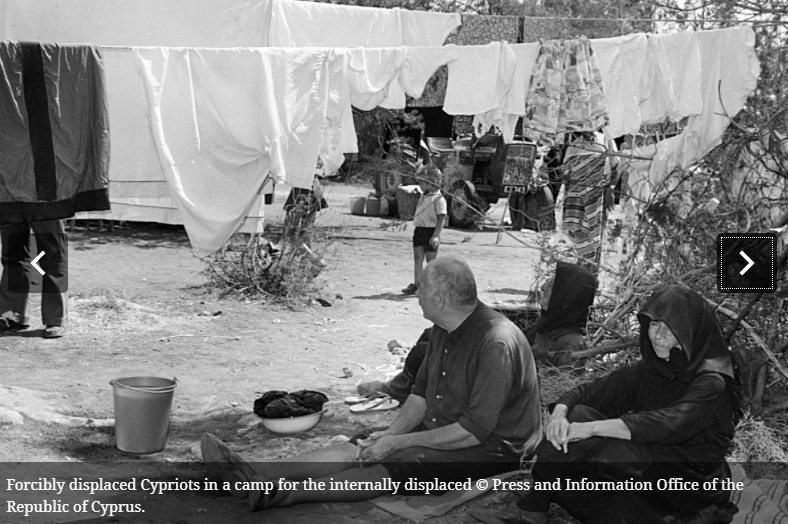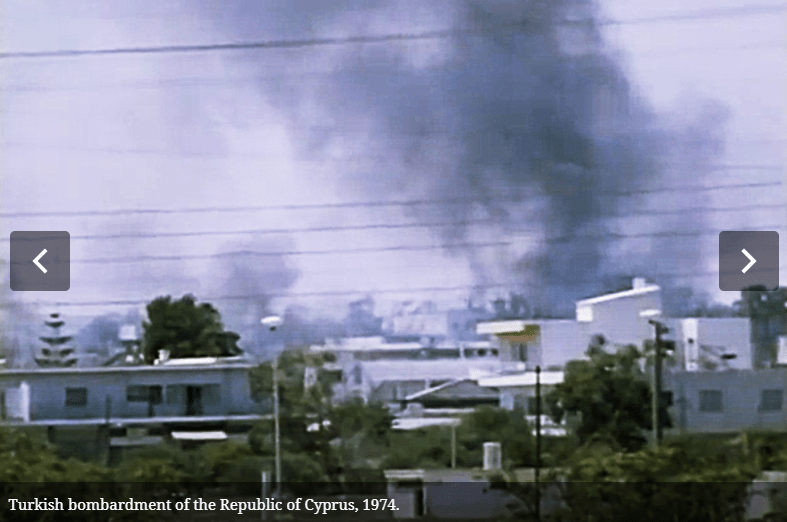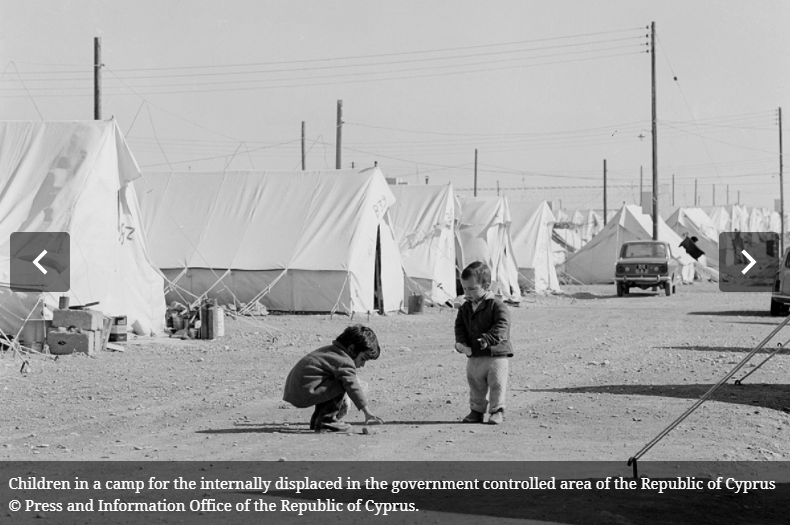Open letter to UN Security Council: The second Turkish invasion of the Republic of Cyprus on 14 August 1974
An open letter to the President and the permanent representatives of the five permanent members of the UN Security Council (and copied to the UN Secretary-General).
14 August 2021
Your Excellencies
Re: The second Turkish invasion of the Republic of Cyprus on 14 August 1974
 As an organisation representing forcibly displaced persons from the Republic of Cyprus who now live in the United Kingdom, Lobby for Cyprus is deeply concerned that neither the President nor any member of the United Nations Security Council has given us the courtesy of any response to our Open Letters of 23 March 2018 (at https://lobbyforcyprus.wordpress.com/2018/03/23/letter-un-security-council/) and 12 April 2019 (at https://lobbyforcyprus.wordpress.com/2019/04/12/letter-unsc-apr-2019/).
As an organisation representing forcibly displaced persons from the Republic of Cyprus who now live in the United Kingdom, Lobby for Cyprus is deeply concerned that neither the President nor any member of the United Nations Security Council has given us the courtesy of any response to our Open Letters of 23 March 2018 (at https://lobbyforcyprus.wordpress.com/2018/03/23/letter-un-security-council/) and 12 April 2019 (at https://lobbyforcyprus.wordpress.com/2019/04/12/letter-unsc-apr-2019/).
We regard this pattern of non-responses as an affront to the dignity of all those, irrespective of ethnicity or religion, who were forcibly uprooted from their homes, forcibly transferred elsewhere and otherwise subjected to inhuman treatment in line with the irredentist and segregationist policies of Turkey. We also suggest that this pattern of non-responses reflects a wider UN practice of ostracising the victims of Turkey, the colonial ruler of Cyprus from 1571 until 1878 and the neo-colonial occupying power in the north of the Republic of Cyprus since 1974.
The UN Security Council is the custodian of the UN Charter and its permanent members ought to conduct themselves in a matter that is commensurate with that hallowed status. They should be protecting the victims of Turkey; they should not be shunning them and running away from questions that must be answered rather than brushed under the carpet.
In the light of the above, we now write to you once again on a mournful day when citizens of the Republic of Cyprus and members of the Cypriot diaspora mark, with pain and sorrow, the 47th anniversary of Turkey’s second brutal invasion of the Republic of Cyprus.
After launching its first invasion on 20 July 1974, Turkey claimed that it had embarked upon ‘a peace operation’ in order to ‘restore the territorial integrity and sovereignty of the Republic of Cyprus’. That first invasion followed a short-lived coup backed by the junta which was then ruling Greece. Yet, despite the fall of the coupist regimes in Athens and Nicosia by 23 July 1974, Turkey re-invaded Cyprus three weeks later, on 14 August 1974. On that second occasion, Turkey had no pretext. Even so, its armed forces embarked upon fresh waves of ethnic cleansing coupled with the unlawful occupation of 36 per cent of the territory and 57 per cent of the coastline of the Republic of Cyprus. All of which reflected pre-1974 Turkish strategy.
- 47 years of Turkish occupation in Cyprus
- ‘The terrible secrets of the Turkish invasion of Cyprus’
- ‘Shock report from Cyprus on the Turkish invaders’
As a combined consequence of its two invasions launched in 1974, Turkey engaged in a series of inhuman or otherwise unlawful acts including but not limited to the following:
- Enforced disappearances;
- Unlawful killings;
- Unlawful burials;
- Mass rapes;
- Forced evictions, forcible transfers and other acts of ethnic cleansing;
- Unlawful acts of colonisation;
- The arbitrary imposition of discriminatory measures;
- The desecration of cemeteries;
- The pillage of churches;
- The theft of cultural artefacts;
- The de facto eradication of the Hellenic and Christian heritage of the Turkish occupied north;
- The arbitrary expropriation of properties belonging to forcibly displaced persons;
- The unlawful destruction of buildings belonging to forcibly displaced persons.
Many abuses, including the appalling infliction of rape upon women and girls, are documented by Volume I of the Report of the European Commission of Human Rights, as adopted on 10 July 1976 and as eventually declassified by the Council of Europe on 31 August 1979. (Volume I of The Report is available at: https://hudoc.echr.coe.int/app/conversion/pdf/?library=ECHR&id=001-142540.pdf).
Details on the destruction of cultural heritage are available in publications of the Government of the Republic of Cyprus at https://bit.ly/3xKaR4Y and the Law Library of the Library of the US Congress (at https://tile.loc.gov/storage-services/service/ll/llglrd/2018296692/2018296692.pdf).
Since 1974, Turkey has been emboldened by the inaction of the international community and the appeasement exhibited by the UN. As a result, Turkey has entrenched its unlawful occupation, completed its programme of ethnic cleansing, colonised the occupied area with its own citizens and continued to flout international law with impunity. Turkey has also embarked upon gunboat diplomacy by, for example, threatening to plunder and pillage the hydrocarbon resources of the Republic of Cyprus. At the same time, Turkey has flouted international law elsewhere, such as Syria, while blackmailing the European Union and forging military as well as nuclear relations with unsavoury regimes across the world.
In the light of the above, we would like to ask a number of questions.
- Why did each of you fail to reply to our letters of 23 March 2018 and 10 April 2019? Will each of you apologise for each of these failures? Will each of you now belatedly respond to each of those letters?
- Has the UN Security Council ever formally consulted the citizens of the Republic of Cyprus, including its forcibly displaced citizens, before adopting any of its multiple Resolutions relating to Cyprus over the past few decades? If so, when? If not, will the UN Security Council change its long-standing habit of cooking up Resolutions behind closed doors before dumping them on the citizens of the Republic of Cyprus? In this context, we remind you that the Republic of Cyprus is a member of the Commonwealth, the Council of Europe and the European Union, all three of which are international organisations dedicated to the rule of law democracy, transparency and accountability to the public. Its citizens should be treated accordingly.
- Why, since 1974, have the members of the UN Security Council effectively sat on their hands and failed to hold Turkey to account for unlawfully occupying the north of the Republic of Cyprus, for engaging in ethnic cleansing, for subjecting citizens to discrimination and for stripping the forcibly displaced citizens of their dignity?
- Why has the UN Security Council failed to activate Chapter VII of the UN Charter? Why has the UN Security Council thereby failed to take any effective action with the aim or effect of imposing sanctions on Turkey, ending its mass violations of international law, delivering international criminal justice and terminating the unlawful occupation, colonisation and exploitation of the north of the Republic of Cyprus?
- Why has the UN Security Council caved in to the segregationist pre-1974 and post-1974 demands of Turkey which, until recently, have sought to replace the Republic of Cyprus with a freak of international relations to be known as a ‘bi-communal, bi-zonal federation’?
- How can either the ongoing de facto partition of the Republic of Cyprus or the proposed ‘bi-communal, bi-zonal federation’ be reconciled with the norms of international law and humanity, as reflected in instruments hostile to Apartheid and segregation, such as the International Convention on the Elimination of All Forms of Racial Discrimination of 1965 (as published by the UN at www.ohchr.org/en/professionalinterest/pages/cerd.aspx)?
- What has the UN Security Council done to name and shame Turkey on account of its conspicuous failure to become a state party to four instruments of international law which prohibit Apartheid namely the International Convention on the Suppression and Punishment of the Crime of Apartheid of 1973, Additional Protocol I of 1977 to the Four Geneva Conventions of 1949, the International Convention Against Apartheid in Sports of 1985 and the Rome Statute on the International Criminal Court of 1998?
- Will the Security Council adopt a resolution which expressly condemns all past, ongoing and future efforts to legalise segregation, apartheid and discrimination in the Republic of Cyprus, including its Turkish-occupied areas? If so, when? If not, why not?
- Why is a policy of appeasement continuing to shape the actions of the UN and its Security Council? In this context, in 2020, did the country you represent at the UN support the Turkish diplomat successfully put forward by the autocratic regime in Turkey, the occupying power in the north of the Republic of Cyprus, to serve as President of the UN General Assembly? If so, why? If not, has your country lodged any protest at the election of this apparatchik of the Erdogan regime?
- Beyond passing toothless resolutions outside the framework of Chapter VII of the UN Charter, what will the UN Security Council do if and when Turkey finds a pretext to invade and occupy the hitherto non-Turkish occupied parts of the Republic of Cyprus? Will the UN Security Council take any effective action under Chapter VII? Or will it close its eyes?
We look forward to receiving your response to each of the questions set out above. We do not expect a repeat of our experience of the last two years when we were shunned by every Permanent Member of the Security Council.
Finally, we note that in paragraph 5 of his Report, dated 9 July 2021 (Document S/2021/635 www.undocs.org/en/S/2021/635), the UN Secretary-General noted with concern that that ‘a majority of the Cypriots continued to not publicly engage on the matter.’ We share this concern. At the same time, we maintain that the UN must actively engage with those who have been most affected by the ongoing occupation by Turkey, namely the forcibly displaced citizens of the Republic of Cyprus, many of whom are represented by organisations such as Lobby for Cyprus that the UN has chosen to shun. We hope that this open letter will help to engineer a change of attitude. The interests of humanity demand it.





- In 1974 Turkish troops invaded the Republic of Cyprus, in order to establish a de facto Turkish-occupied northern zone. Approximately 170,000 Cypriot citizens of Greek and Christian origin were forcibly displaced and are are still denied their right to return by Turkey.
- Lobby for Cyprus is a non-party-political human rights organisation that campaigns for a unitary Republic of Cyprus free from Turkish occupation and without any forms of segregation along ethnic or religious lines.
